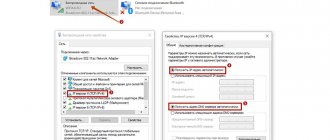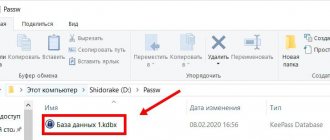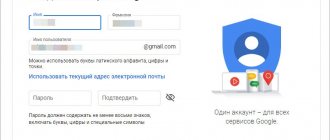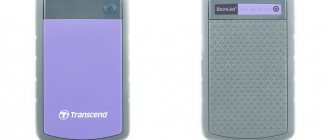What is DNS and why is it needed?
Let me first tell you what DNS is and what it is used for, so that you understand the principles of operation of this happiness, and therefore everything that I will tell you throughout the text (by the way, it is possible that To understand some terms, it will be useful for you to read my article “Computer network terminology or what is what [IP, TCP, UPD, ICMP, MAC, etc.]”).
DNS (English: Domain Name System) is something like a system (generally speaking, a server) responsible for matching a domain (ala, google.ru) and the IP host (ala, 192.168.1.1) where this domain lives ( There is also the concept of a zone, but we will omit it now so as not to fool our heads).
Speaking quite simply and using an example: you can go to Google by typing google.ru into the address bar of your browser, or you can enter 209.85.148.104. So, so that you don’t go crazy, remembering the IP names of all the sites you want to visit and painfully typing them into the address bar, in fact, there is this DNS, which, when you enter a domain name, knows what IP this domain lives on and allows You to the site. Without DNS, surfing the Internet would be a fun business of entering tons of numbers instead of website addresses.
So to speak, a local example of DNS can be the hosts file (a request to which, by the way, has priority over access to DNS servers), where, if necessary, a list indicates domains and IP addresses associated with them (which, by the way, is often used by viruses and other dirty tricks, indicating, say, the domain vkontakte.ru a completely different IP address, different from the real one, and when you go to this very contact of yours, then in the address bar you have the correct domain, but in practice you see a completely wrong site, which is a mirror created to steal your password).
A Brief Introduction to Computer Networks and the DNS Protocol
Computers and other devices must have some unique identifiers in order to recognize each other on a global scale. On the Internet, the role of such an identifier is played by an IP address of the form 193.23.56.184. Some computers receive this address on a permanent basis (static IP addresses), while for others it changes every time they connect to the Internet (dynamic IP addresses). Static addresses are most often assigned to servers that perform important functions, such as email processing, website support, file distribution, and so on. Additionally, some ISPs provide static addresses to all their users by default, but the usual practice for obtaining a static address is to enter into a special agreement with the ISP. Dynamic addresses are most often obtained by users who do not have permanent dedicated access to the Network, for example, owners of modems, ADSL or 3G/GPRS mobile Internet. Each time you connect, the provider issues a new IP address from its pool. So, computers on the Internet recognize each other using IP addresses. But another system is more convenient for people; it’s easier for us to remember the names of sites - domains. Agree, it is much easier to work with a search engine when we access it by the name yandex.ru, and not by the address 87.250.250.3 The DNS service is responsible for matching an IP address to a domain name. It’s very similar to a phone book, where you can find a person’s number using their first and last name. SkyDNS represents a significant evolution of the standard DNS service, providing not only a basic service, but also the ability to filter and block dangerous or unwanted sites.
Why you shouldn’t use SkyDNS - the first point
The fact is that to receive (match) a domain and IP, the server needs time to receive, process the request, respond, etc. Naturally, this time partly determines the loading speed of your sites, and the higher it (the time), the slower you surf the Internet.
Naturally, the providers providing you with access are not fools and have their own DNS, which is now (if you haven’t changed anything) indicated in your network connection settings (or in the router settings).
It goes without saying that they, due to the fact that they are closest to you and in the same (or almost the same) network with you, will of course respond to requests many times faster than the servers of an incomprehensible company located somewhere in the forest far away power.
You can verify the SIM using the Namebench program, which clearly shows that compared to the provider (and 7 others), this same SkyDNS, frankly speaking... It’s sad in terms of speed (in the screenshot the result of alternate testing of several DNSs by querying 8000+ sites with 250 requests each, where DNSs are ranked according to their speed):
The router is configured with provider DNSs, which are second on the list of tests, plus the router caches them.
And this is the first reason why there is no point in using such “joy”. The point, if you like, is not in the speed of the request as such (although it plays a huge role despite the seemingly small values), but in the speed of delegation of various addresses, reaction to changing IPs, etc., etc., which, in In a normal case, it can take several hours to a day, and in the case of any skye, several weeks or more.
SkyDNS
SkyDNS is one of the leading domestic developers of cloud content filtering and Internet security systems. The company's services are used by thousands of individuals and corporate users, more than 6,000 educational institutions, 300 partners and over 200 providers in Russia, Kazakhstan, Ukraine and other countries.
Sky DNS offers the following products:
SkyDNS.School – cloud-based content filtering for educational institutions and libraries. Fully complies with the requirements of legislation 139-FZ and 436-FZ. Reliable protection of children and students from information that can cause them harm: propaganda of drugs, alcohol, pornography, suicide, extremism and others .
An intuitive interface, flexibility and ease of settings ensure quick deployment of the content filter on any network equipment. There is no need to install additional software - SkyDNS. The school works with any operating system on any computer.
Possibilities:
Blocking phishing, virus sites, botnets, anonymizers, most types of banners and pop-up ads.
Internet filtering and site blocking using our own database with more than 105 million resources.
Network access management for 62 categories, with the ability to regulate access by role.
“Clean” Internet mode and setting up your own “white” and “black” lists.
Detailed reports, statistics on traffic usage and the number of blockings.
Secure search engine from SkyDNS for added student protection.
Centralized management of settings for an unlimited number of computers.
The SkyDNS.School Z package is an advanced solution for content filtering in educational institutions and libraries, includes the ZyXELKeenetic Internet gateway and a special tariff from SkyDNS, which allows you to configure filtering for specific profiles and devices. This kit allows you to protect an unlimited number of devices on the network and significantly simplify the implementation of a content filtering system in educational classrooms.
Possibilities:
Protecting children from information dangerous to their health and development, in accordance with 139-FZ and 436-FZ.
A cloud solution allows you to save your budget, as it does not require re-equipment and the purchase of expensive servers.
Blocking anonymizers, proxies, phishing and virus sites, botnets and most online advertising at the request level without going to the page.
Centralized management of Internet access for more than 60 categories, and its own “black” and “white” list.
A special operating mode that blocks access to any resources except trusted sites from the “white” list, which by default includes 60,000 educational sites.
Safe search from SkyDNS - redirects requests from other search engines to a secure one and additionally filters requests for prohibited content.
Advanced traffic usage statistics for each device allows you to track which resources students access most often. Tracks up to 50 devices, data is stored for up to 12 months.
SkyDNS.Business – cloud content filtering for business users. The quality of service allows you to protect the company from modern cyber threats, reduce inappropriate Internet activity and increase the efficiency of employees.
An intuitive interface, flexibility and ease of settings ensure quick deployment of the content filter on any network infrastructure: Internet gateways, proxy servers, Wi-Fi, DSL and other network equipment. No additional software installation required - SkyDNS.Business works with any operating system on any computer.
Possibilities:
Internet protection from phishing and virus sites, botnets.
Blocking anonymizers and most pop-up Internet advertisements.
Internet access management for more than 62 categories, with the ability to regulate access by role.
“Black” and “white” lists mode - users get access exclusively to permitted sites.
Branding of the page with access prohibition.
Detailed reports, statistics on traffic usage and the number of blockings.
Centralized settings management for multi-branch structures.
SkyDNS.Business + tariff is a corporate content filter for organizations with an extensive network of branches and offices. The solution allows you to protect up to tens of thousands of computers in a single or distributed network without loading the Internet connection.
Possibilities:
Quick setup and deployment of filtering—less than half an hour for ten separate branches.
The company's information security is ensured through a cloud solution and does not require the purchase of expensive hardware.
Filtering works on any operating system and device, regardless of the computer's power.
Centralized management of an unlimited number of devices on any operating system, regardless of the power of the PC or devices for Internet access.
Internet protection from phishing, virus sites, anonymizers, cryptominers and proxies.
Blocking of the source of the threat occurs at the request level, even before moving to the resource.
The ability to create several filter administrators, control their work and change filter settings in the action log in your personal account.
Setting up filtering for different access profiles and devices separately.
An agent program adapted for use on a corporate network to protect laptop computers, including outside the organization’s network - filtering even for remote employees.
Detailed statistics on Internet traffic usage by profiles and devices for two years and the ability to download this data in CSV format.
Personalized resource blocking page with the ability to design it in a corporate style, indicating the contacts of the system administrator.
The SkyDNS.Business Z kit is a hardware solution for small organizations that includes the ZyXELKeenetic Internet gateway and a special tariff from SkyDNS that protects up to 50 computers and devices with different Internet access settings. This kit greatly simplifies the implementation of the system and configuration of content filtering at workplaces.
Possibilities:
Internet protection from phishing and virus sites, botnets.
Blocking anonymizers, proxies, cryptominers and most types of online advertising.
Centralized management of Internet access for more than 60 categories and its own “black” and “white” list.
Advanced traffic usage statistics with detailed reports for the user profile and each device.
Your own resource blocking page with the ability to design it in the company’s corporate style, indicating the contacts of the system administrator.
SkyDNS.Wi-Fi is a solution for content filtering of Wi-Fi hotspots for public use. The service reliably protects entrepreneurs in accordance with the current legislation of the Russian Federation - the fine for the absence or non-compliance of a content filter ranges from 20 to 50 thousand rubles. The SkyDNS service is easy and quick to connect, does not require a technician to visit you, and can be set up in 5 minutes.
Filtering from SkyDNS does not affect the speed of Internet access, and flexible settings make it easy to protect users from negative information on the Internet.
Possibilities:
Manage Internet access using your own database of more than 105 million sites, which can be filtered by 62 categories.
Centralized settings management for multi-branch structures.
Blocking fraudulent sites, phishing pages, most types of pop-up advertising.
Detailed reports with detailed statistics on Internet traffic usage.
Branding of the blocking page in a corporate style.
Return
Other nuances about SkyDNS
Further reasons are that all these promised security miracles are quite dubious. Why?
- Firstly, this is not an antivirus, not an antispyware, or a program at all (even implemented using cloud technologies), but a simple DNS, that is, it protects you from malicious scripts, downloaded and launched virus files, nasty things loaded into the cache, etc. it simply cannot;
- Secondly, what follows from the first and the above in general, as far as I understand, it is something like an immunization solution using Spybot, when it simply adds thousands of malicious domains known to it to the hosts file, denying them access by matching the domain to the good old local 127.0.0.1 (IP address with which a computer can access itself over the network, regardless of whether it has a connection to the network, its type and the address of the computer in it). Only in this case it is implemented on the DNS side, which is filled with a certain number of names of nasty sites, when requests for which access is simply blocked (that is, the DNS simply does not give out the IP for some virus-ridden site super-freebie-xxx.ru ). Only now, I think that the lists of these malicious sites... were taken from Google or something else like the network and the WOT plugin for browsers

For those who don’t know, I’ll explain. When indexing sites, my favorite Google, also analyzes them for malicious code, scripts, files, etc., and, accordingly, if it finds some kind of dirty trick, it warns about it both people trying to access the site and the site owner , which, relatively speaking, is an additional effective way to fight viruses.
So, why do I think that the lists were pulled from somewhere else? Yes, because in order to have your own, as the developers say, addresses of millions of dangerous and disgusting (in terms of content) sites, you need to have, at a minimum, your own search engine and index the entire Internet, simultaneously scanning sites for viruses, pornographic/violent/other - scary content, etc.
What a company of this scale simply doesn’t have, I think, i.e., all it does is simply deny access to supposedly unsafe sites, and whether it’s true or not, what’s unsafe there and whether they have complete information at all is unknown. Hence the conclusion.. Do you want SkyDNS? Just search for the information you need via Google;
If SkyDNS compiles its own lists, this means that they have the functionality and power of a search engine, constantly scanning millions of sites for content, content, changes, maliciousness, files, etc., which in itself is nonsense and almost impossible.
- Fourth, all these statements and attempts to sell users security of this level are quite comical, especially given the fact that the lists themselves are closed, it is impossible to fully see and completely change their content and, again, we have the same WOT as an example , which has been compromised (look for news online);
Work technology
The SkyDNS operating technology is based on the use of a cloud DNS server, which is configured for service users instead of the provider's DNS server. The Domain Name System (DNS) is used to convert a domain name, a character string of letters and numbers, into an IP address that is used to communicate directly with a remote device.
For example, when a user types the website address www.anti-malware.ru in the browser, the DNS client in the operating system requests the DNS server (the address of which it learns from the network settings, usually configured on the provider’s server) for the real address of the web server and receives a response — 148.251.151.141, this IP address is used to access the website using network routing protocols.
If you need to block access to www.anti-malware.ru, it is enough to change the response from the DNS server and send the user information about a different IP address, where instead of the expected site a page with information about blocking will be displayed. SkyDNS provides the address of its own DNS server, which is set in the settings of the operating system or network equipment and filters according to specified parameters.
Figure 1. Scheme of accessing the site without using SkyDNS and after switching to SkyDNS
SkyDNS uses a single DNS server IP address for all client connections, but allows granular filtering rules to be configured for different clients and profiles. In order to determine the client account and the required filtering profile, one of two options is used - linking the profile to the external IP address of the computer (if Internet access is provided directly, without NAT translation), or by installing the SkyDNS Agent program for Windows on the computer or using ZyXEL Keenetic routers with a built-in SkyDNS module.
A technical disadvantage of the SkyDNS operating scheme can be considered the relative ease of bypassing blocking. Without additional settings, the user can change the DNS server on his device to completely bypass the blocking or write the IP addresses of individual websites that he needs to access into the hosts service file. To reduce the likelihood of bypass, you need to deny access to other DNS servers at the network gateway level or set restrictions in the operating system if access is only from administered computers, which in the case of the SkyDNS solution is easy to do even for not the most qualified administrator.
And further further further
Another reason why, in my professional opinion, it is not worth resorting to using this “miracle” of SkyDNS of human thought:
As it is written on the website of the service itself, its free version methodically pushes contextual advertising at you.
By the way, every time I think about this, it brings a broad smile, because, you see, it’s quite comical to hear: a service that positions itself as striving to make your Internet journey clean, comfortable and safe, itself pushes advertisements at you even where it's not there :). And here's the thing:
- No matter how these lovely developers swear that everything is confidential, etc., etc., but still normal contextual advertising has always been positioned (and will be positioned) on the collected statistics, because in this case it is many times more effective and brings in more income (which is logical, because if the advertiser knows that you mostly visit only sites with games, then there is no point in randomly pushing you an advertisement about felt boots, because it would be much more effective to show it about some super-interesting fresh toy);
- As you hope you have already understood, in this regard, DNS is one of the powerful ways to collect this statistics, since all your requests to all sites are known, which, I am sure, is definitely used, i.e. there can be no talk of any kind of super-confidentiality . Partial - yes. Full? Unlikely.
I suspect that statistics are also collected in the paid version, that is, you, for your own money, allow some guys from SkyDNS not only to limit your access somewhere (as I said, you still won’t be able to view or edit the full lists), but also collect statistics about you, which, by the way, no one knows where and why can be traded.
What you can use yourself as an alternative to SkyDNS
The user can organize such protection much easier, free of charge and - significantly! - more effective:
- It is enough to install some similar and free browser plugin (thousands of them);
- Immunize Spybot (it will fill browsers, hosts, etc., with thousands of addresses and actually block access to them, just like your SkyDNS does);
- Use Google (or Yandex) as a search engine (there are enough filters and safe search, you just need to configure it) and a browser from one of them;
- Install and configure NoScript and Ghostery for the browser;
- It’s trivial to install, configure and use uBlock or Adguard in general (the latter will also protect privacy);
- Install and configure an antivirus and firewall - the overall protection will still be more powerful when using a similar service with supposed virus protection;
- Do you want a complex, multi-stage, but adequate option with traffic and content filtering? A good router will allow you to set up rules for both address lists and file types, parts of the URL in the request, types of traffic (videos, torrents, etc.) and even content;
- Too lazy to do all the above? Use the hosts file, there are already ready-made options;
- Don't know who to pay money to? Look for programs for filtering content by traffic - no need to spend your money on closed services. Yes, and you only pay once.
A simple complex of all this will not only save you from a bunch of problems, advertising, fraudulent content, viruses and much more, but will also do it for free, and at the same time improve your computer literacy so that you don’t write stupid comments that people write under this article .
Overview of the SkyDNS mobile filtering option
| Protection against banners, pop-ups, contextual and other advertising in the browser and mobile applications | Blocking dangerous sites, social networks and resources with adult content |
| Maximum flexible filtering settings and familiar service management interface | Ability to apply different filtering settings for different mobile devices |
| Protection does not depend on the type of Internet connection - mobile or Wi-Fi and on the web browser used | You decide which sites your child can access. |
As a result, you can safely use the Internet on both your smartphone and tablet without fear of encountering inappropriate content on the Internet: porn, gambling, drugs, alcohol, extremism and other unnecessary information.
In addition, you provide yourself with an additional level of protection against phishing, malicious web resources and botnets.
Enable mobile filtering now!
Instructions for setting up mobile filtering on iOS/Android
What problems does SkyDNS mobile filtering solve?
- Filters the Internet on mobile devices - both iOS and Android.
- Blocks dangerous and fraudulent sites, resources with paid subscriptions, pornography and other unwanted content.
- Blocks access to any domains and topics that you specify in the settings.
- Restricts access to online games, app stores, and social networks.
- Disables banners, pop-ups and other advertising, including advertising in mobile applications.
- Controls children's access to the Internet, no matter where they are.
- Keeps statistics about the child’s online activity.
Complete protection everywhere
Wherever you use mobile devices protected by the SkyDNS service - at home, at work, on the road, in another city, filtering will work. Mobile filtering does not depend on the type of Internet connection - mobile or Wi-Fi, the web browser you use - Chrome, Safari, Yandex, Opera or some other, and on your preferred mobile applications .
Easy to connect
Now it’s easy to connect our service to your mobile devices based on iOS and Android. In a few simple steps, you install a special application on the desired device, turn it on and you're done! Now your device is reliably protected by our service. After installation, you will be able to remotely change the filtering profile without making changes to the device itself.
Child safety
Mobile filtering makes it very convenient to link children's tablets and smartphones with children's profiles. At the same time, you can filter the Internet differently for different devices, for example, for a teenage child’s smartphone and for a small child’s tablet.
This way, you will be aware of your children's online activity, and they will be able to surf the Internet without fear of encountering inappropriate web content.
Protect your mobile devices with SkyDNS service
Instructions for setting up mobile filtering on iOS/Android
Ad blocking
Use our service to block online advertising on mobile devices. The mobile filtering option will save you from intrusive online ads on your smartphones and tablets. In this case, pages and applications load completely.
The service filters out almost all advertising. Graphic banners, pop-ups, video, audio and contextual advertising will no longer distract you - neither on the pages of your mobile web browser nor in your favorite mobile applications!
Due to filtered out extraneous texts and images, web pages and mobile applications load noticeably faster. In addition, your devices will not be harmed by malicious code distributed under the guise of harmless online advertising.
| Website with advertising | Website without advertising |
Protection against Internet threats
In addition, our service by default blocks malicious and phishing resources, as well as calls from SkyDNS-protected devices to servers that manage botnets. Therefore, connecting mobile content filtering significantly increases your online security.
Using alternative DNS servers instead of SkyDNS
Despite all of the above, sometimes it is necessary to resort to alternative DNS servers for a while (by alternative I mean different from those of the provider).
When is this necessary? Usually in cases where the provider’s DNS is buggy in some way, not wanting to open certain sites, that is, the Internet itself exists, but due to the lack of mapping of domains to hosts, sites are accessible only via IP.
Naturally, in this case you have to resort to alternative solutions, but, of course, it would be nice to use not SkyDNS, but something more humane, like GooglePublicDNS (address 8.8.4.4 or 8.8.8.8).
To do this, go to:
- “Start - Settings - Control Panel - Network Connections (for Windows 7 here: “Network and Sharing Center - Change adapter settings”);
- Right mouse button on the network connection - Properties - Internet Protocol version 4 (TCP/IPv4) - Properties";
- In the “Preferred DNS server” line, indicate 8.8.4.4 or 8.8.8.8, click “OK - OK”;
- Let's try (you may need to turn the connection on and off: right mouse button on it - “Disable” - then right mouse button again - “Enable”).
Confidentiality is also not guaranteed here, but there is no need to pay anyone. I already wrote above about the other methods.
Difficulties that may arise
Modern telecommunications networks are complex architectures, a number of mechanisms of which can seriously complicate or make impossible the operation of our service. Some providers (or Internet gateways of organizations) use “transparent” proxies, which speed up the work of users on the Internet and reduce traffic consumption. The problem is that this technology interferes with the correct operation of SkyDNS, as a result, sites that you prohibit will not be blocked. We are working to overcome these limitations of DNS technology. We hope that in the future SkyDNS will be able to perform its tasks in any environment, but for now we recommend contacting support in all difficult cases when our service does not work as expected.
A separate subheading for those who want to write a comment about SkyDNS
No need. I'm serious. The topic is fully covered in the article and 150++ comments under it. Disclosed by technically savvy people who have eaten more than one dog on this topic, who work in this field, etc., etc.
Read them (and the article) until you are completely enlightened exactly as many times as you need to understand that SkyDNS does not need your protection, at least not on this site.
Your priceless, epic opinion, if it does not contain an equally epic (in volume, in characters and content - at least in the size of the article + all comments) argumentation (preferably with graphs, screenshots and other facts, up to your biography, work experience and reputation) we don’t really need.
You have been diligently writing comments under the article for many years now, but the evil moderator allegedly deletes them? About











